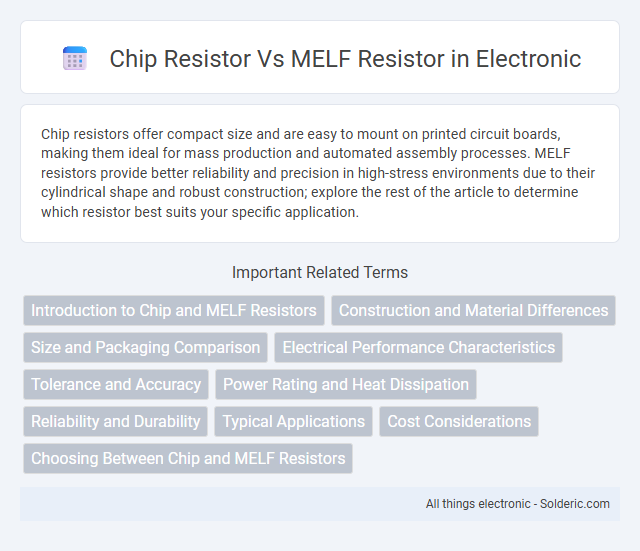Chip resistors offer compact size and are easy to mount on printed circuit boards, making them ideal for mass production and automated assembly processes. MELF resistors provide better reliability and precision in high-stress environments due to their cylindrical shape and robust construction; explore the rest of the article to determine which resistor best suits your specific application.
Comparison Table
| Feature | Chip Resistor | MELF Resistor |
|---|---|---|
| Shape | Rectangular | Cylindrical |
| Mounting | Surface Mount Device (SMD) | Surface Mount Device (SMD) |
| Power Rating | Typically 1/8W to 1/2W | Typically 1/4W to 1W |
| Tolerance | +-0.1% to +-5% | +-0.1% to +-1% |
| Temperature Coefficient | Higher TCR (typically 50-200 ppm/degC) | Lower TCR (typically 2-25 ppm/degC) |
| Reliability | Good for general applications | High reliability, preferred in precision circuits |
| Cost | Lower cost | Higher cost due to precision and reliability |
| Common Applications | General electronics, consumer devices | Precision measurement, aerospace, medical devices |
| Environmental Stability | Moderate | Excellent stability under harsh conditions |
Introduction to Chip and MELF Resistors
Chip resistors are surface-mount devices known for their compact rectangular shape, widely used in electronic circuits for precise resistance values and minimal inductance. MELF (Metal Electrode Leadless Face) resistors feature a cylindrical shape with metal end caps, offering superior reliability, stability, and tolerance in high-precision applications. Both resistor types serve distinct roles in circuit design, with chip resistors favored for space-saving and cost efficiency, while MELF resistors excel in thermal performance and long-term durability.
Construction and Material Differences
Chip resistors are constructed using a rectangular ceramic substrate coated with a thin film or thick film resistive material, typically metal oxides or cermet, offering compact size and ease of mounting. MELF resistors (Metal Electrode Leadless Face) feature a cylindrical glass or ceramic body with metal electrodes at both ends, providing excellent stability and precision due to their robust construction. Your choice between these depends on the required durability and performance characteristics in your electronic application.
Size and Packaging Comparison
Chip resistors are typically smaller with rectangular packaging, allowing for higher component density on printed circuit boards (PCBs). MELF resistors feature cylindrical, metal-lead encapsulation that offers better thermal performance but occupies more space. Your choice depends on balancing the need for compact design with thermal reliability and ease of automated assembly.
Electrical Performance Characteristics
Chip resistors offer stable resistance values with low noise and are well-suited for general-purpose circuits requiring precise tolerance levels. MELF resistors provide superior thermal stability and higher power ratings, making them ideal for high-reliability applications under extreme conditions. Your choice between the two should consider factors like temperature coefficient, noise performance, and power dissipation requirements.
Tolerance and Accuracy
Chip resistors typically offer tolerance levels ranging from +-0.1% to +-5%, providing reliable accuracy for most standard applications. MELF resistors, with their cylindrical shape and precise manufacturing process, often achieve tighter tolerances as low as +-0.05%, making them ideal for high-precision circuits. The superior accuracy of MELF resistors is attributed to their stable construction and lower thermal noise compared to chip resistors.
Power Rating and Heat Dissipation
Chip resistors typically offer lower power ratings, usually around 0.125W to 0.5W, making them suitable for compact circuits with moderate heat dissipation needs. MELF resistors provide higher power ratings, often ranging from 0.25W up to 1W or more, allowing better heat dissipation due to their cylindrical metal body and larger surface area. Your choice should consider these differences to ensure reliable performance under your device's power and thermal constraints.
Reliability and Durability
Chip resistors offer high reliability and durability in standard electronic applications due to their robust construction and resistance to mechanical stress. MELF resistors provide superior stability and performance in high-temperature and high-vibration environments, making them ideal for precision circuits that demand long-term reliability. Choosing the right resistor for your project depends on the specific durability requirements and environmental conditions it will face.
Typical Applications
Chip resistors are widely used in surface-mount technology (SMT) circuits due to their compact size and ease of automated assembly, making them ideal for general-purpose applications such as consumer electronics, automotive systems, and industrial equipment. MELF resistors excel in high-reliability environments requiring superior precision and stability, commonly found in aerospace, military, and medical devices where performance under extreme conditions is critical. Both resistor types serve distinct roles based on application demands, with chip resistors favored for mass production and MELF resistors chosen for specialized, high-performance circuits.
Cost Considerations
Chip resistors typically offer lower production costs due to their simple rectangular shape and widespread manufacturing processes, making them more cost-effective for high-volume applications. MELF resistors, with their cylindrical shape and precision glass-encased elements, incur higher material and assembly costs, which is reflected in their price. The choice between chip and MELF resistors often depends on balancing budget constraints with the required tolerance and reliability levels in electronic designs.
Choosing Between Chip and MELF Resistors
Choosing between chip and MELF resistors depends on factors such as size, power dissipation, and application reliability. Chip resistors offer compactness and cost-effectiveness for high-density PCB assemblies, while MELF resistors provide superior thermal performance and precision in high-reliability environments. Engineers prioritize MELF resistors for stability in harsh conditions and precise tolerance, whereas chip resistors suit general-purpose electronics with space constraints.
Chip resistor vs MELF resistor Infographic

 solderic.com
solderic.com